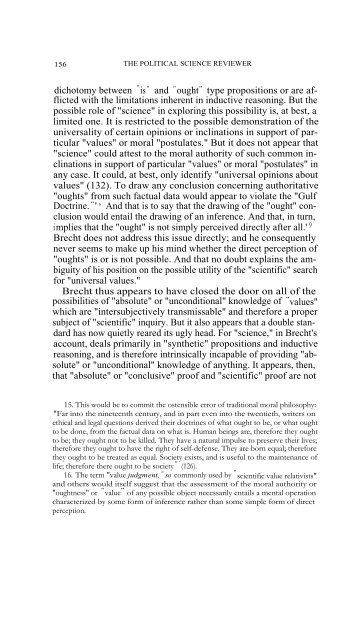ARNOLD BRECHT'S POLITICAL THEORY REVISITED Political ...
ARNOLD BRECHT'S POLITICAL THEORY REVISITED Political ...
ARNOLD BRECHT'S POLITICAL THEORY REVISITED Political ...
You also want an ePaper? Increase the reach of your titles
YUMPU automatically turns print PDFs into web optimized ePapers that Google loves.
156<br />
THE <strong>POLITICAL</strong> SCIENCE REVIEWER<br />
dichotomy between " is " and " ought " type propositions or are afflicted<br />
with the limitations inherent in inductive reasoning. But the<br />
possible role of "science" in exploring this possibility is, at best, a<br />
limited one. It is restricted to the possible demonstration of the<br />
universality of certain opinions or inclinations in support of particular<br />
"values" or moral "postulates." But it does not appear that<br />
"science" could attest to the moral authority of such common inclinations<br />
in support of particular "values" or moral "postulates" in<br />
any case. It could, at best, only identify "universal opinions about<br />
values" (132). To draw any conclusion concerning authoritative<br />
"oughts" from such factual data would appear to violate the "Gulf<br />
Doctrine. " ' s And that is to say that the drawing of the "ought" conclusion<br />
would entail the drawing of an inference. And that, in turn,<br />
implies that the "ought" is not simply perceived directly after all.' 9<br />
Brecht does not address this issue directly; and he consequently<br />
never seems to make up his mind whether the direct perception of<br />
"oughts" is or is not possible. And that no doubt explains the ambiguity<br />
of his position on the possible utility of the "scientific" search<br />
for "universal values."<br />
Brecht thus appears to have closed the door on all of the<br />
possibilities of "absolute" or "unconditional" knowledge of " values"<br />
which are "intersubjectively transmissable" and therefore a proper<br />
subject of "scientific" inquiry. But it also appears that a double standard<br />
has now quietly reared its ugly head. For "science," in Brecht's<br />
account, deals primarily in "synthetic" propositions and inductive<br />
reasoning, and is therefore intrinsically incapable of providing "absolute"<br />
or "unconditional" knowledge of anything. It appears, then,<br />
that "absolute" or "conclusive" proof and "scientific" proof are not<br />
15. This would be to commit the ostensible error of traditional moral philosophy:<br />
"Far into the nineteenth century, and in part even into the twentieth, writers on<br />
ethical and legal questions derived their doctrines of what ought to be, or what ought<br />
to be done, from the factual data on what is. Human beings are, therefore they ought<br />
to be; they ought not to be killed. They have a natural impulse to preserve their lives;<br />
therefore they ought to have the right of self-defense. They are born equal; therefore<br />
they ought to be treated as equal. Society exists, and is useful to the maintenance of<br />
life; therefore there ought to be society " (126).<br />
16. The term "value judgment, " so commonly used by " scientific value relativists"<br />
and others would itself suggest that the assessment of the moral authority or<br />
"oughtness" or " value " of any possible object necessarily entails a mental operation<br />
characterized by some form of inference rather than some simple form of direct<br />
perception.
















